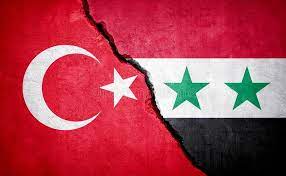The Ministry of National Defense responded to Assad’s remarks that Turkish troops should withdraw from Syria before the meeting: “We are in Syria to eliminate terrorism.”
Following President Recep Tayyip Erdoğan’s call for ‘normalization with Syria’ and a meeting with Syrian President Assad, which was first made on June 28, statements came from both sides.
While Erdoğan and Assad were expected to meet, the Syrian President stated that Turkish troops should withdraw from Syria before the meeting. His such stance is not new. Though Erdoğan’s desire to meet with Esad following Turkey’s failed Syria policy has intensified recently.
Ministry of National Defense responded to Assad: ‘We are in Syria to eliminate terrorism’ “We are in Syria to eliminate terrorism,” Ministry of National Defense sources said in a statement regarding the normalization process with Syria.
Which issues will be on the table in the Special-Esad meeting?
During Özgür Özel’s meeting with Bashar al-Assad, the issue of refugees will come to the fore. Turkey’s military presence in Syria and its support to the FSA and other armed groups will also be among the important topics.
The planned meeting between Turkey’s main opposition party Republican People’s Party (CHP) Chairman Özgür Özel and Syrian President Bashar al-Assad is of great importance in terms of reshaping Turkey’s relations with Syria, Turkey’s longest border neighbor.
According to party sources, the main issues to be discussed in this critical meeting are expected to include neighborly relations, refugees, FSA and other armed groups, and proposed solutions.
NEIGHBORLY RELATIONS AND SYRIA POLICY
The CHP does not find it right to have no relations with a neighboring country. The party considers it unacceptable for a country like Syria, which has the longest border with Turkey, to have broken relations. Party sources say that due to the mistakes of the AKP government’s Syria policy, the Syrian issue, together with the refugees, has become the most serious and complex foreign policy issue in the history of the Republic. It is also emphasized that these mistakes are now widely known and talked about. Asylum-seekers and lack of will One of the main concerns of the CHP is the current government’s lack of will to resolve the negative consequences of its Syria policy. There is concern that this situation will become unsustainable in terms of refugees in Turkey and developments in Syria.
Özgür Özel’s plan to meet with Assad is said to have been put on the agenda in order to break this deadlock and open a new page in the Syrian file. It is also stated that Erdoğan’s government has not presented any plan, program or policy on Syria and that there is no road map on the refugee issue.
SOLUTION PROPOSALS
CHP considers the refugee issue as a humanitarian issue and believes that a meeting with Assad is necessary to solve this problem. The first issue to be discussed in the meeting is the refugee problem and how to solve it. According to the party members we interviewed, there are two main concerns raised by the Syrian administration. One is Turkey’s military presence in Syria and the other is Turkey’s support for some elements in Syria. The CHP’s ultimate goal is the presence of Syrian troops on the Syrian border and Assad’s sovereignty over Syria. However, party members underline that Turkey’s security must also be considered.
FSA AND ARMED GROUPS
The CHP has also conducted detailed studies on the Free Syrian Army (FSA) and admits that they have analyzed models around the world and that this issue is a serious problem. The CHP argues that it is not right for Turkey to support armed groups against the Syrian regime and states that they are working on a realistic and time-bound plan on this issue.
RESULTS OF THE MEETING
If the meeting takes place, the CHP is also expected to request consultations with the Ministry of Foreign Affairs. The report prepared after the talks is expected to be evaluated within the party and then shared with the relevant ministries.
